Augusta Solar again denied by Augusta supervisors in 5-1 vote
VERONA – After an approximately four-hour long public hearing and discussion, the Augusta County Board of Supervisors rejected Augusta Solar’s permit application on July 24.
Dozens of speakers came to the meeting to speak for and against the project. They filled the supervisor’s meeting space, including the chairs in the back of the room. The full hearing is available online.
A brief review of the project
Augusta Solar is an over 1,600-acre solar energy system, landscaping buffers included, split up into five sites. The project is operated by AES, a company operating functional solar energy systems in Spotsylvania County, Wight County and Charles City.
This is not the first time a version of this project has come to the board. In 2019, the supervisors rejected the project, then 2,700-acres with visual buffers included. The News Leader recently published coverage of the company and landowner's appeal of the county's 2019 decision.
More: Augusta Solar, landowners were rejected in 2019. The lawsuit lasted nearly four years.
In May, the Augusta County Planning Commission declined to recommend Augusta Solar and found it was not in accord with the Augusta County Comprehensive Plan.
More: 2019 Augusta Solar project again rejected by county government
The July 24 meeting was split into two votes. First, the board considered an appeal of the planning commission's decision by Augusta Solar. Second, the board would decide to approve or decline the entire energy system’s special use permit request.
The second vote would determine if the project lives or dies before getting off the ground.
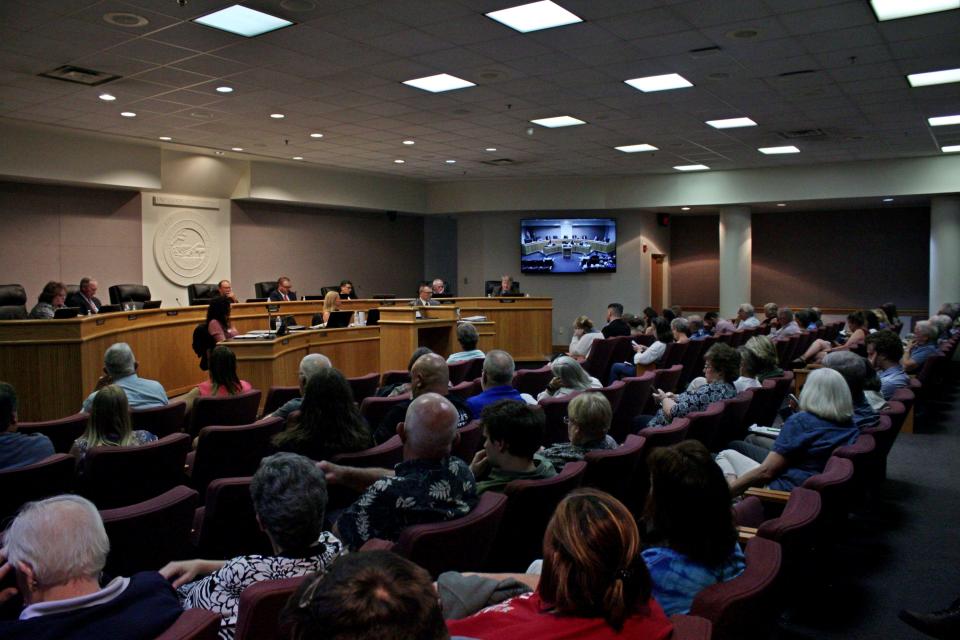
The Quillens, owners of Waynesboro Nurseries, speak out
Several members of the Quillen family, owners of Waynesboro Nurseries where some of Augusta Solar would be located, spoke during the public hearing.
“We know this land,” said Karen Quillen. “We have been good stewards of this land for four generations, almost one hundred years. No one loves this land like we do. No one knows it like we do. We live on this land. We will continue to live on this land."
She choked up as she spoke.
“We have bent over backwards for many years and many iterations of this project, trying to do what you have asked us to do,” said Karen Quillen. “I urge you to approve this project so that we don't have to sell to foreigners that want to come buy cheap land. I urge you to approve this project so that we can pay the taxes and keep owning the rest of the land that we do and keep it green and farming.”
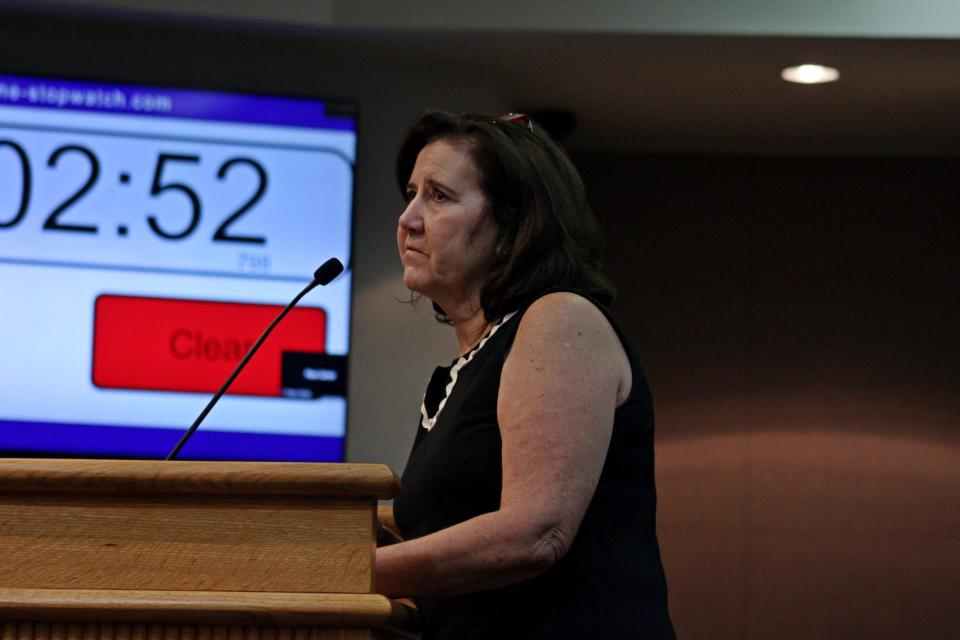
The project’s original size was cut down by 61% through talks with county staff. Excluding the buffering and spacing needs, there would be 131 acres under panel, about a fifth of a square mile.
“This project will contribute millions of dollars to Augusta County, and when the project is over, the land can go back to agriculture or be used for business, homes, factories, depending on the owner's desires, and with direction from the board,” said Kirk Quillen.
Being able to put solar on the Waynesboro Nurseries property to keep it fiscally solvent should be within his right, Max Quillen argued. His family spoke to many solar companies interested in their property for solar because of the high voltage power lines that run through it. Kirk Quillen agreed, “I think we should have the privilege of using our land the way we'd like to, with a little guidance from you guys.”
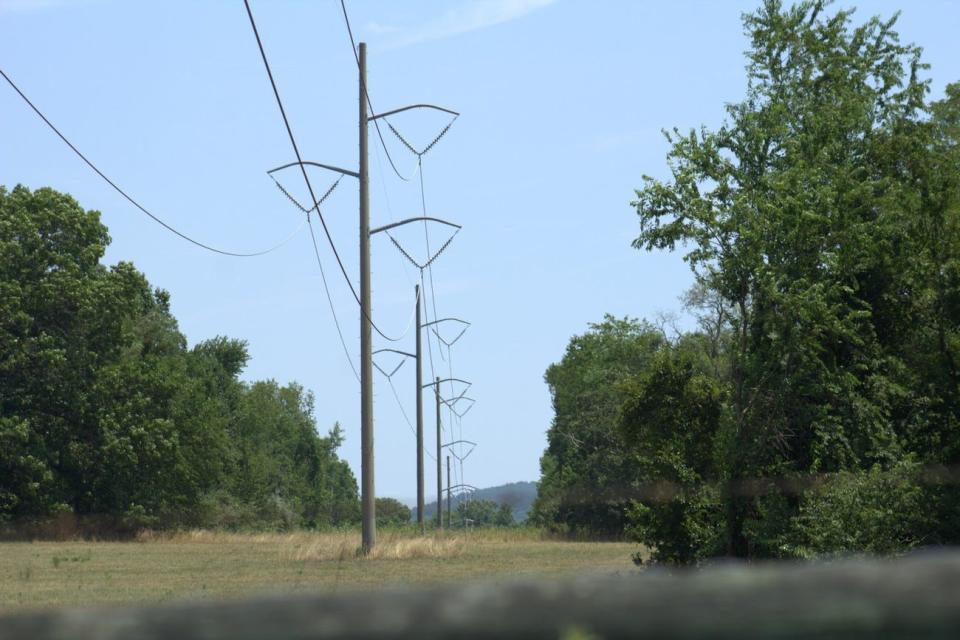
Max Quillen felt denying the project to protect farmland was not the right way to think about the issue.
“There is no future for traditional agriculture in the South River District," said Max Quillen. "Why is that? It's because of the comprehensive plan. No ag. None. That's the plan. The plan is for all the farmers and all the landowners to sell to developers for warehouses, factories and subdivisions. We don't wanna do that with all of our property. Some of it, yes. It's okay. But some of it, we actually like to keep. Solar is a way to do that."
He later continued, “Nurseries and, let's say, traditional farmers, they don't farm for their neighbors' visual enjoyment. It's great people enjoy watching us grow trees or watching the Martins till their fields and all the other agriculture. It's very scenic. It's great. I'm glad everyone enjoys it. It's not why we do it, though, actually. It's about putting land to use."
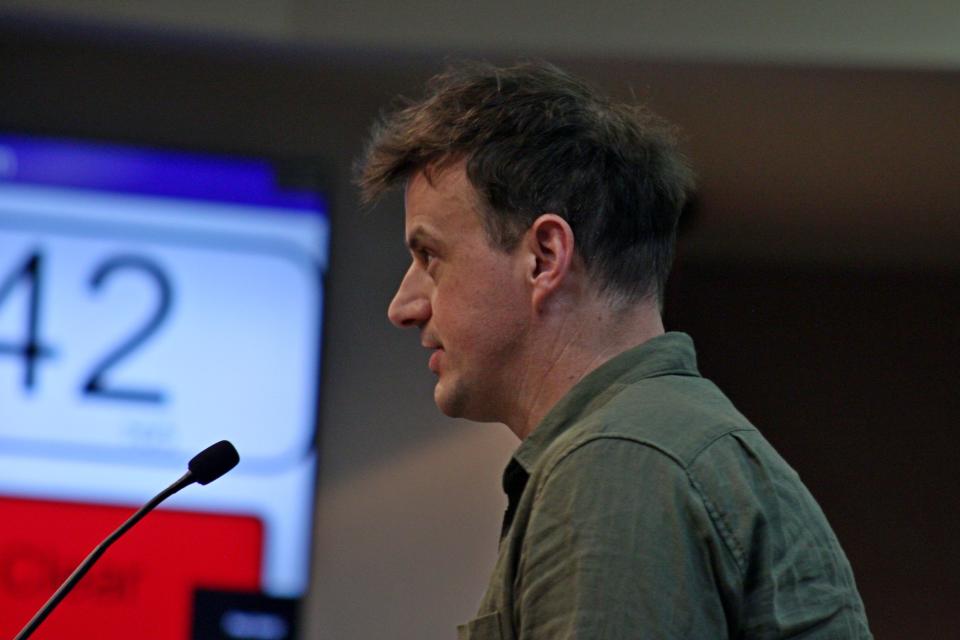
Augusta Solar asked for "good faith" consideration
Senior Director of Development for AES Matt Hooper has argued in favor of the project before the board several times, including during the planning commission hearing on the solar facility.
"You've passed a zoning ordinance banning solar in this area," Hooper said. "Now this project, at that time, was specifically exempted from that ordinance."
The exemption means, if the board were to approve Augusta Solar, "That's it. There will be no more projects in this area and no more projects of this size in the county."
He asked the board to consider the project in good faith. AES's legal representative also called for the board to bargain and negotiate in good faith.
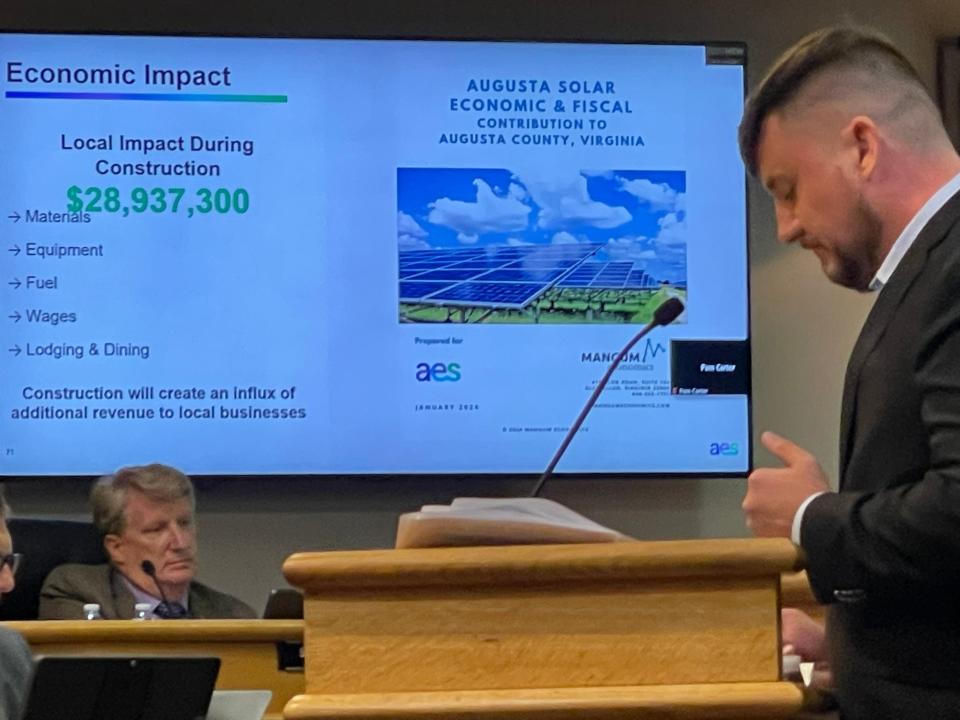
Public feedback informed the supervisor’s decision
The county received 44 emails requesting the project be denied and 14 requesting the project be approved. A petition to deny the project was sent in on behalf of the Hampton subdivision with 127 signatures.
Of the dozens of speakers during the four-and-a-half hour supervisors meeting, 14 were in favor of the project and 22 were against it.
Two former supervisors spoke during the hearing, reflecting the split opinions of the speakers writ large.
Nancy Sorells was in full support of the project. She felt the solar panels, stuck in the ground on posts, would keep the underlying farmland from being developed into warehouses, factories, or residential homes for the next 35 years.
“I'm asking that you respect the overall landowner's rights, remember the importance of keeping land in farming, and honor the vision of the comp plan as a whole, rather than drilling down into a small, convoluted, and contradictory bit of language that was shoehorned into the comp plan at a later date to support a blinding desire by some elected leaders for a countywide solar moratorium,” said Sorells. “In a county that puts agriculture first, this project is really the last hope for land in this area to stay farmland.”
Steve Morelli started by saying it was good to see the staff and “most of” the supervisors. Morelli's departure from office is the subject of an ongoing battle over a closed session before the board accepted his resignation.
Morelli cited the urban service area zoning, saying it was “set up for growth.” He said the residents signed up for an agricultural community when they moved into the area, they "did not sign up for solar." He was also critical of the Quillens’ argument the solar project would keep their generations-long business financially solvent.
“I like the farmers, and I like the Martins, the Quillens, great people,” said Morelli. “Somebody said we gotta help them because they've been here generations after generations. My family is military, we lost family members. We came back with body parts missing. Does that make a farmer or Morelli better? Nope. That's a choice we made. If somebody lived here for five years, it don't mean that I'm better than them because I got five generations. Just me, it's something you chose to do.”
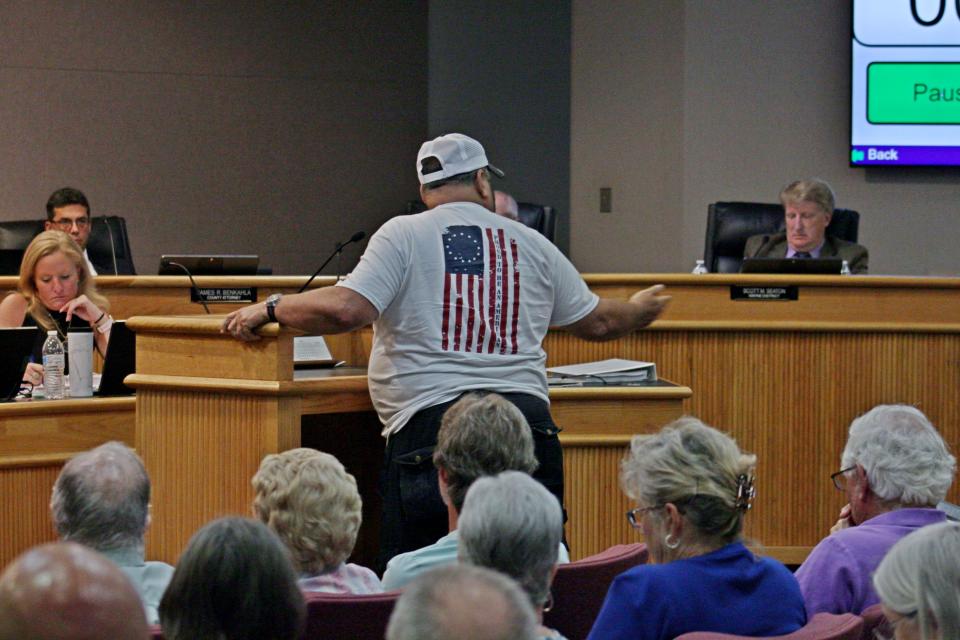
Solar policy 1 addresses the economy
Two supervisors, Scott Seaton and Carolyn Bragg, took opposite positions on the project. Both spoke at length, arguing the specifics of the county’s solar guidelines. Augusta Solar would be located in the South River District, the district Bragg represents.
The first county policy guideline for solar reads, “Recognize the employment opportunities, especially for distributed solar, and economic diversification opportunities that utility scale solar provide."
Bragg said the supervisors should consider “the revenue that may be lost” if the project is approved. She pointed to investments made by Augusta Water, “the loss of industry that would provide jobs for our citizens,” and “the comparison of the tax revenue generated by the addition of an industry or community versus a full solar facility.”
“The comprehensive plan has identified this area [urban service areas] as a growth area [where] Augusta County citizens will have the opportunity to live, work, and play,” said Bragg. "In addition, these solar energy generating plants will change the character of this community. It’ll change Stuarts Draft as a whole.”
With every other kind of development, Seaton argued, the county would be on the hook to pay for more infrastructure development. Housing, factories, warehouses, all of it requires infrastructure. More people means more schools, more police, more firefighters.
“The notion that large-scale solar must avoid urban service area and community development areas because Augusta Water has invested in water and sewer near these properties is frightful,” said Seaton. “Why would any landowner want to cooperate with the county or the service authority if the county prevents them from using their land in the future for some new business?”
The new tax revenue from a solar project of this size, without the need to invest in more infrastructure, was a plus for Seaton.
“We have developers around the county who are prevented from developing available land because the county has not been willing to upgrade the fire flow limitations that are present in communities around the county,” said Seaton. “Taxes from the project would allow us to improve the fire flow and unleash development in these areas without increasing rates imposed by Augusta Water or taxes imposed by the county.”
Solar policy 2 looks at rural viewsheds
Solar policy two reads, “Desire to maintain rural viewsheds and agriculture as a predominant component of our economy, but sees synergy among agricultural and rural land development and utility scale solar development so long as the clustering, size, or fragmentation of such facilities does not have undue adverse impact on the surrounding neighborhoods.”
Bragg said some of the project's multiple sites are located near residential development areas or traffic areas that would “alter the landscape of the community.”
“Although buffering is required, it takes many years to grow to the height where the visual impacts are minimized," Bragg said. "There are some areas that back up to residential developments and along roadways that, because of the topography, planting will not obstruct the views.”
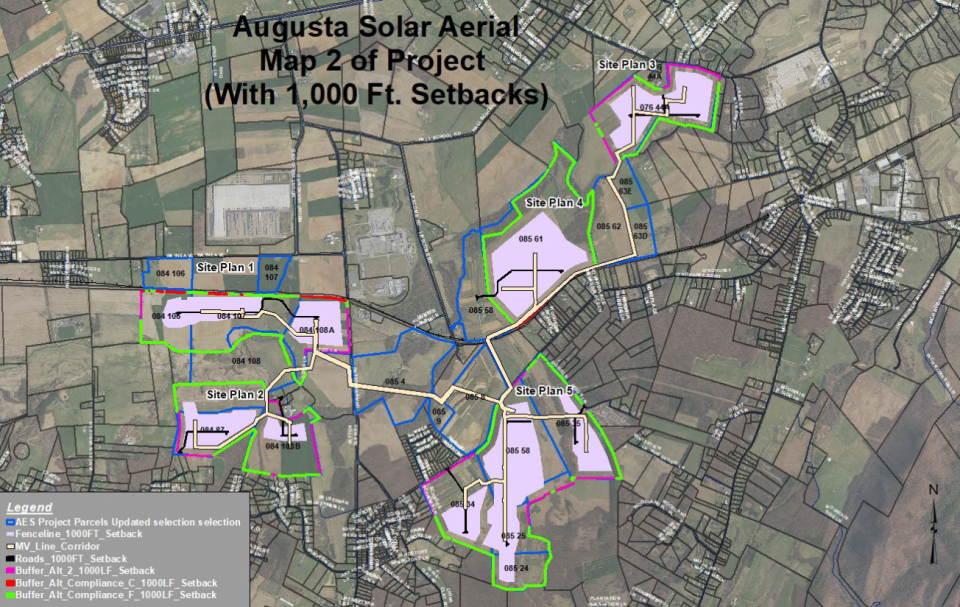
Seaton pointed to the trees already growing around many of the project areas that would go toward the mandatory visual buffer.
“No ordinance in Augusta County guarantees your legal right to a view,” Seaton said. He later added, "I will always have heartburn about a landowner owning the view of another land owner’s operation.”
Solar policy 8 seeks to preserve open space in the county
Solar policy eight reads, “Support projects that seek to actively create opportunities and partnerships that provide for natural open spaces and outdoor recreational activities such as pedestrian corridors, wildlife watching areas, and fishing areas, especially in publicly accessible land and rights-of-ways.
The solar project would help preserve native plants and keep the areas out of development for 35 years, its advocates argued.
“The alternative to solar fields is housing and business, large and small, which certainly would not protect open space,” said Seaton. He later continued, “In the next 35 years, these pieces of land will be the only space left for the county to create outdoor activity.”
Bragg cited the same fact to make the opposite point, “After the project is decommissioned and potentially returned to ag, there could be the potential for significant incompatibility of land uses with the permanent agricultural operations and the built environment and vision in the urban service and community development areas, which will grow over 35 years.”
Bragg also opposed the project for two reasons related to project clustering. She explained the project is broken into several sites, rather than one large solar energy system. In addition, two projects are nearby on Wayne Avenue.
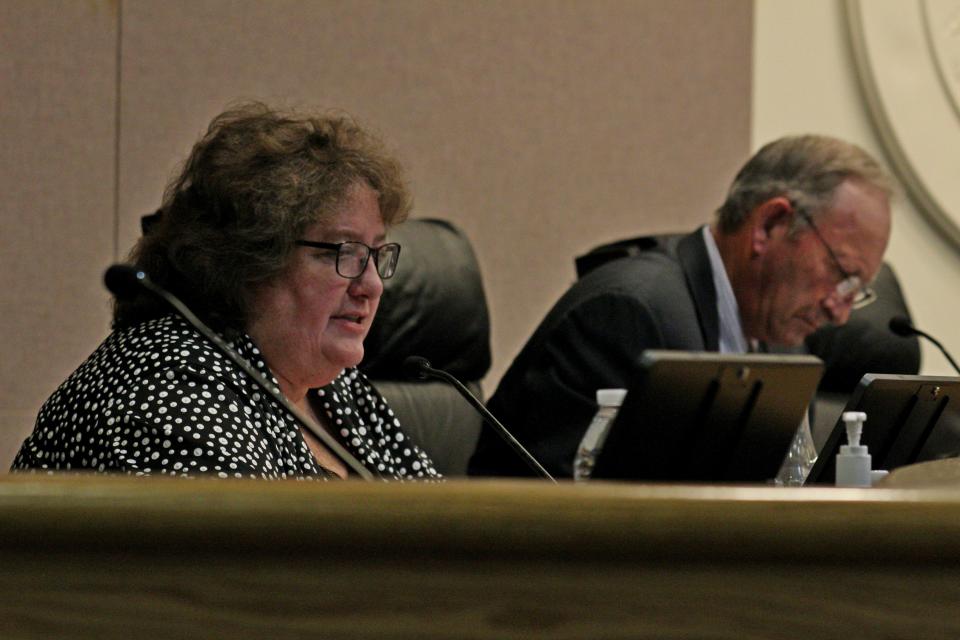
The second death of Augusta Solar
AES's legal representative asked the board to consider a delay to address the board's concerns. Before the final vote, Seaton made a motion to delay the vote to August. The board rejected the delay in a five-to-one vote, Seaton voting against. Supervisor Gerald Garber was absent due to illness.
The Augusta Solar project died in a five-to-one vote. Bragg made two motions, the first denying the planning commission decision appeal and the second denying the special use permit application. Seaton was the sole dissenting vote.
Right before the crowd left, Bragg said the fight over Augusta Solar had fractured the community and called for neighbors to talk to neighbors.
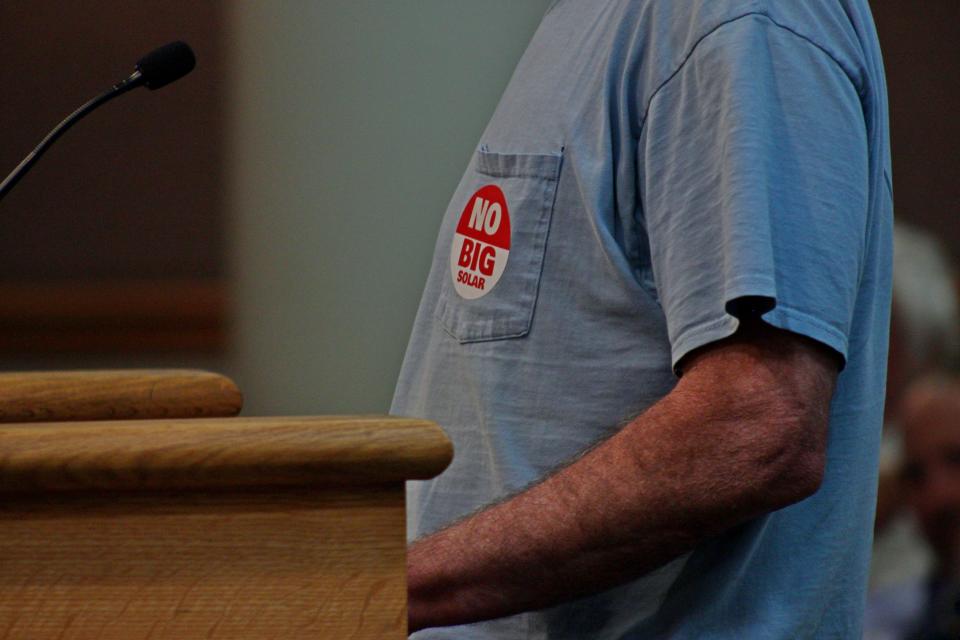
After the vote, the Quillens stood in the government center lobby for a few minutes after the meeting. Max Quillen told The News Leader he would make a statement at another time.
Hooper told The News Leader he was disappointed, but couldn’t comment further.
Previous project coverage from The News Leader
To follow The News Leader’s previous coverage of the project see the following publication timeline:
Sept. 6, 2018 – What to know about the proposed solar energy farm in Augusta County
Sept. 11, 2018 – Augusta County could renew farmers' viability with solar farms
Nov. 27, 2018 – Study results avoid solar farm delay, impacts
Jan. 18, 2019 – A decision; gain solar, wait for industry growth?
Jan. 31, 2019 – Landowners baffled at solar hesitation
Feb. 27, 2019 – Solar vote delayed amid more project questions
May 22, 2019 – County issues solar decision
June 26, 2019 – Augusta Solar, landowners appeal county's solar decision
Aug. 15, 2019 – County eyes next step in adding solar to comprehensive plan
Aug. 30, 2019 – Board of Supervisors make first appointments to solar committee
Sept. 6, 2019 – Augusta County's cost of outside legal fees higher with multiple lawsuits
Sept. 13, 2019 – With solar committee set, landowners worry about being left out
May 29. 2024 – 2019 Augusta Solar project again rejected by county government
July 22, 2024 – Augusta Solar, landowners were rejected in 2019. The lawsuit lasted nearly four years.
Lyra Bordelon (she/her) is the public transparency and justice reporter at The News Leader. Do you have a story tip or feedback? It’s welcome through email to lbordelon@gannett.com. Subscribe to us at newsleader.com.
More: New steakhouse opening this fall in downtown Staunton
More: Supervisors declare Augusta drought emergency, new WARM executive director: THE DIGEST
This article originally appeared on Staunton News Leader: Augusta Solar again denied by Augusta supervisors in 5-1 vote

